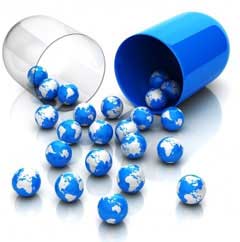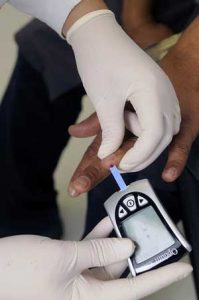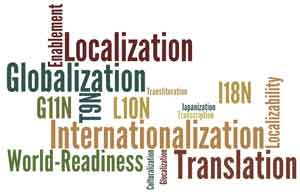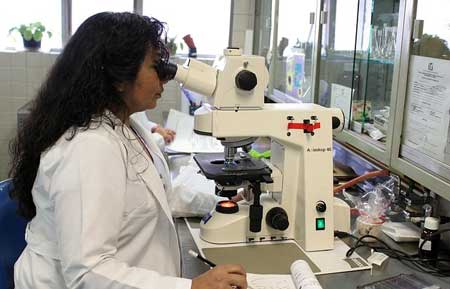The world is moving ever closer to the point of convergence both in the physical sense, through rapid transportation, and in the realm of ideas, through advanced telecommunication. This convergence has a myriad of consequences in politics, business, and lately in the globalization of healthcare and the life science sector. Navigating cross-national political structures, regulations, language barriers and cultural practices successfully is a must to compete in a globalized market.
Traditionally, multinationals have concentrated in heavy industries such as steel and automotive, but recently, other industries are under increasing pressure to globalize. The healthcare and pharmaceutical industries are at the vanguard of recent globalization trends as demands on them are growing tremendously, and worldwide rates are expected to continue increasing.
With the Globalization of Healthcare and Life Sciences Comes Translation

Those set to make a successful leap into emerging markets will localize their services and products to meet the particular needs of their new frontiers. A dedicated and professional language services partner is vital for any business’ efficient transition into new markets.
With respect to the globalization of healthcare and pharmaceutical industries, the needs for such services are already a fact of life. Medical document translations for everything from informed consent forms in clinical trials to patents and contracts post-production are regularly requested.
Meanwhile the need for comprehensive translation programs is only expanding.
Emerging markets, especially those in the BRICS nations, are projected to continue to create an expanded market for healthcare and pharmaceutical businesses. A 2014 World Economic Forum paper predicted that about a third of all healthcare expenditure will occur in developing countries by the year 2022.
These projections highlight the inevitability of healthcare and pharmaceutical growth in international markets. Many companies will unquestionably create viable services and products, but only those that understand the linguistic, cultural, and regulatory needs of their new territories will prosper.
So how does one adapt?
Globalization of Healthcare: Biopharma Rising to the Occasion

Cost-cutting, already a prominent part of the industry, likely means a change in business models. Companies need consolidation with established firms and collaboration with smaller firms based in emerging markets to remain efficient and cost-effective.
With either strategy, translation services will play a key role in streamlining transitions and growth. As each country will apply varying regulatory hurdles, the path to adapt to globalization of healthcare and life science processes is set to be rocky. Inefficiencies coming from an inadequate understanding of legal and regulatory guidelines, either in pre or post-production, will prove fatal.
Smart firms will employ language services that not only translate documents but skillfully articulate the linguistic nuances particular to the industry and country. A concerted and longstanding (meaning pre through post-production) language service strategy conducted by experts in their fields will be vital.
What the Globalization of Healthcare and Sciences Means For The Future
Rising expectations for better health solutions don’t simply apply to government officials; they’re also pointed towards private life science firms. Accessible information on industry practices and greater market choice has created ever more sophisticated healthcare consumers.
Consumers and patients not only demand quality health products, they also require increased customization and convenience. For the firm looking to setup shop in emerging markets, these requirements must be met.
Customization and convenience can mean several things for life science firms.
First: the consumer base needs customized products.
To achieve this, firms need to undergo clinical trials and drug development processes that reflect the growing diversity of their customers. Though technological limitations inhibit individual pharmaceutical customization, existing technology can help life science firms customize their products by accounting for the environmental and genetic/ethnic particularities of their markets.
Adaptation to different ethnic groups, cultures, and languages is paramount for developing and testing more global medical solutions as outlined in the presentation below.
Second: customization and convenience must translate into brand and marketing localization.

All promotional materials, including websites, blogs, pamphlets and ads, should not only appear in the market bases’ native language, they should also cater to the unique cultural practices of the region and the particular variation of the native language, such as Spanish adapted for Latin American audiences.
Adaptability and innovation are at the forefront of global growth strategies for Life Science firms. The importance of increasing accessibility to more diverse populations, particularly through language and cultural adaptation of products and trials, can not be understated when developing a plan for success.
Learn More About Our Life Sciences Translation services
Written By: Godfroid Niyobuhungiro, Marketing Intern at Language Connections
About Language Connections:
Language Connections is one of the top language service companies in the US. Over the last 30 years, we’ve focused on providing the best business translation services, interpreting services, as well as interpreter training and customized language training programs. In addition to top-tier corporate language training, we offer certified corporate interpreters and professional business translation services in 200+ languages. Our network includes linguists with backgrounds in all major industries. They’re ready to meet your needs, whether they’re for technical translation services, legal translation, government translation services, international development translation services, education translation services, life sciences translation, or something else. Reach out to us today for a free quote on our cost-efficient and timely translation services, interpreters, or other linguistic services.
Language Connections Inc.
2001 Beacon Street, Suite 105,
Boston, MA 02135
Phone: +1-617-731-3510
Email: service@languageconnections.com


